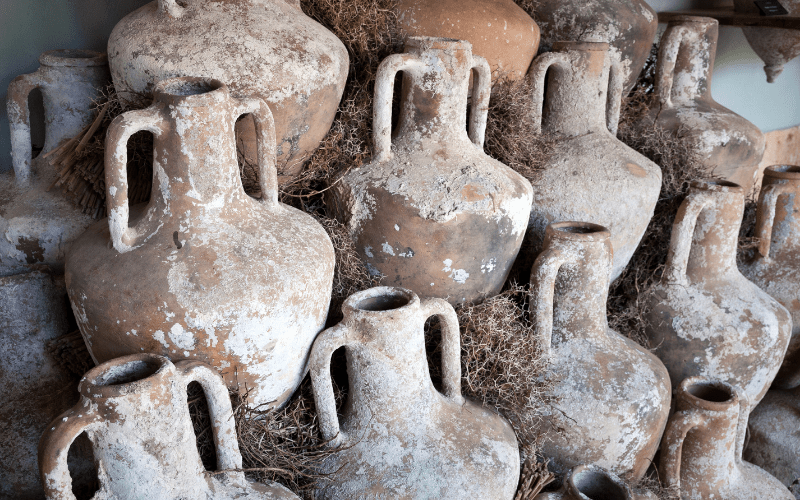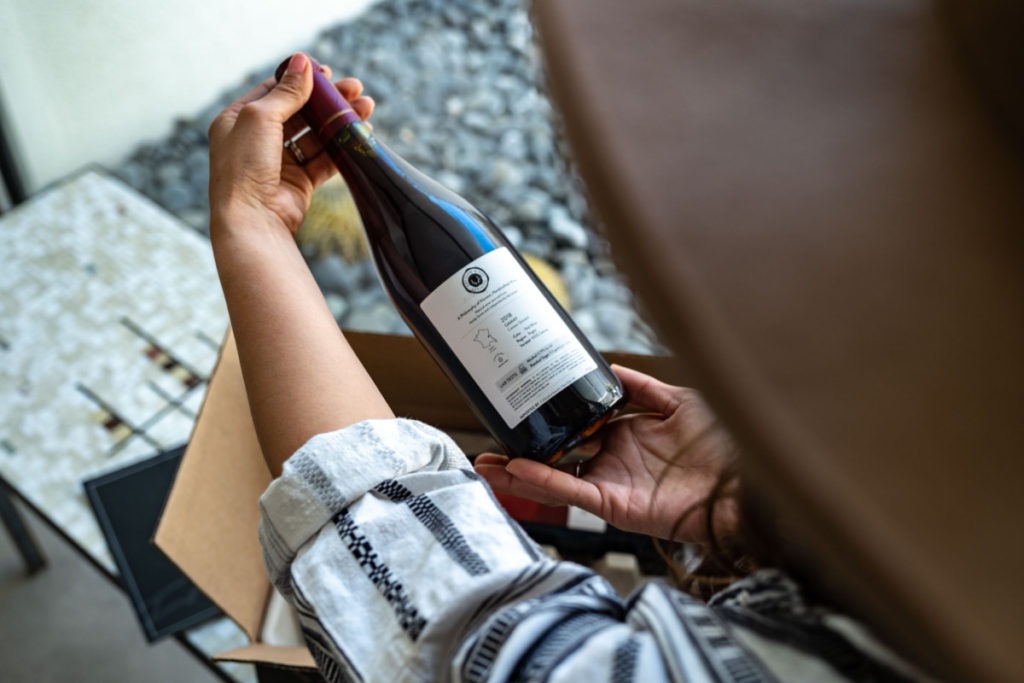
How is Today’s Wine Different from Biblical Wine?
Have you ever wondered if modern wine is different from biblical wine or ancient wine? Most wines that are produced today are manufactured on a large scale and contain high levels of alcohol, sugars, and additives. Biblical wine was grown and produced in the most natural way possible. Therefore, it was composed of low levels of both alcohol and sugar. It also did not include any of the modern additives that are often used today. Quite a few differences can be found when comparing biblical wine vs. modern wine.
Scott Shifferd’s article, “What Kind of Wine Did Jesus Drink?” provides an excellent explanation as to why the alcohol content of biblical wine differs so much from the wine most producers make today. The article also provides interesting details on biblical wine vs. modern wine.
“The sugar of grape juice can only ferment to 3 or 4% alcohol with wild yeast — airborne yeast. For grape juice to exceed 4% alcohol, then the winemaker must add yeast. The yeast added to ancient wines produced between 4–11% alcohol. Alcohol kills these yeast cells and prevents levels of alcohol from exceeding ~10%. Today, wines average 12–20% alcohol due to modern fermentation by adding sulfur dioxide and Saccharomyces (a cultured GMO yeast) to a late harvest of ripened grapes with higher fructose (Winemaker Magazine, Wines & Vines, UC Davis, International Biblical Encyclopedia, “Alcohol in the Church,” Bible Wine).”
It is important to mention when the Bible mentions “wine” it is not referencing the wine most of us enjoy today. It may not even be referring to an alcoholic beverage at all. Wine in the bible can refer to just simple grape juice or wine that does not exceed an alcoholic content of about 10%. Understanding the context in which the word was used is often a clue as to which of the two versions of “wine” is being referred to.
My Personal Take
I personally enjoy the occasional glass of wine while cooking, with dinner or when gathering with loved ones. However, after learning the difference between biblical wine vs. modern wine, I was determined to find a company that made wines similar to what Jesus and the people of the Bible drank.
Well, I found one after much research! And I can’t wait to tell you about them! May I introduce….. Dry Farm Wines! See on the video below, what sparked my curiosity to research this topic and my honest review of Dry Farm Wines.
A Modern Day Wine Similar to Ancient Wine

Meet Dry Farm Wines
Todd White found Dry Farm Wines, a subscription-based wine delivery service that prides itself in being more than a wine club and offers a unique, international selection of pure natural wines. They base their philosophy on a farm-to-table approach as they describe it as a story that, “begins with a healthy farm and ends with a vibrant sip.”
You may be asking yourself “what is ‘pure natural wine’?” There is no exact definition, but a consensus is agreed upon among the natural wine community. Pure natural wine must be organically or biodynamically farmed. There also must be nothing added or removed during the process from vine to wine.
Some companies source wines that are organically grown or sugar-free based wines but, Dry Farm Wines is the only company in the world that selects wine based on their set of strict criteria. There are no other wine companies out there whose wines meet their level of high standards.
What Makes Dry Farm Wines Unique?
Not only is the experience of having a wine selection curated just for you unique, but so is the wine itself. Dry Farm Wines works closely with farmers to ensure that the wines they are selecting meet their very strict criteria. This includes farming practices, purity levels, etc. The wine selected is so exclusive that less than 0.01% of the wine manufactured throughout the world meets Dry Farm Wines criteria.
Dry Farm Wines criteria include the following:
- certified organic or biodynamic
- vegan
- keto and paleo-friendly
- alcohol content that ranges from 7 to 12.5%
The majority of wine you may find at restaurants, vineyards, or on the shelves of your liquor or grocery stores is on upwards of 20% or more alcohol content. This is due to growers and producers using synthetically developed yeast strains, rather than the yeast found growing on the grapes naturally. These lab-made yeast strains are what give them the ability to produce a high percentage of alcohol within each bottle of wine.
- sugar levels of below 1g/dL
- free of 76 different FDA approved additives
- low in sulfites

How to purchase Dry Farm Wines
Dry Farm Wines makes it simple. Become a member in three easy steps and start having pure natural wine selections curated just for you.
#1: Chose the type of wine you wish to receive:
- red
- white
- rose
- sparkling
#2: Chose your box size – number of bottles you wish to receive for each shipment:
- 6 bottles per shipment
- 12 bottles per shipment
#3: Chose the frequency at which you wish to receive your boxes:
- monthly
- every other month
- every 3 months
Subscription pricing is dependent on which box size you chose to receive. The 6-bottle box is priced at $159 per shipment and the 12-bottle box is priced at $299 per shipment. For more information on Dry Farm Wines visit their website or check out their YouTube channel.
A Gift For You!
Each new member will earn an extra bottle (for a penny) with their first order of wine when they use my link below.
Encouraging a Healthier You
While some of us drink wine for pleasure, after a hard day, to complement dinner, or maybe to enjoy socially with friends. We all enjoy the health benefits that wine provides. Wine is the only alcoholic beverage choice that has remained as an encouragement within the Dietary Guidelines for Americans year after year. When you purchase wine in hopes of fueling yourself with all those added health benefits, don’t you expect to receive them? Wines selected by Dry Farm Wines grant you that expectation.
Organically grown crops, free of harmful pesticides and herbicides, have a higher concentration of nutrients – like antioxidants. Studies have shown that pesticide-treated grapes and vines produce wine in which we can test and find levels of pesticides within them. Therefore, whatever the vine or grape is treated with you end up drinking.
Just like pesticides and herbicides, additives also end up in the wine that you drink. The FDA does not require producers to include these additives on their labels under certain conditions. While you may be under the impression that you are picking a clean “natural” wine you may not be. This is why Dry Farm Wines conducts its own in-house, independent lab testing. They rule out any additives or chemicals that may be present within the wine. Giving you the peace of mind that you are drinking what you were sold.
Promoting Healthier Soil and Stronger Earth
By choosing farmers who practice dry farming, Dry Farm Wines promotes healthy soil, as well as land and water preservation. According to Dry Farm Wines, by relying on the natural moisture provided by the soil, rather than irrigation techniques, dry farming has preserved about 1.4 billion gallons of water so far.
According to the European Journal of Agronomy, the number of chemical pesticides and herbicides used by farmers has increased exponentially over the past 50 years or so. These chemicals destroy helpful microorganisms that are present in our soils. Organic farmers, like those chosen by Dry Farm Wines, are trying to fight the rise in these numbers and increase the health of the soil and the earth.
Supporting Small Business Owners
Now more than ever, small business owners and small farms need support. By rewarding farmers and growers who chose organic, green, and biodynamic farming practices they are encouraging the growth of these practices. Dry Farm Wines growers currently farm 7% of all organic vines in Europe.

Conclusion
You can ensure that all wines selected by Dry Farm Wines are dry-farmed, free of industrial additives, independently lab tested, lower in alcohol concentration than most modern wines (close to biblical wine), fermented by native yeast, and priced by quality.
Ask yourself WWJD (What Would Jesus Do)? Perhaps he would drink Dry Farm Wines. 😉 Cheers friends!
Article Written by Charity Smith (founder of A Poised Perspective) and Kayece Flood
If you enjoyed this article we would love for you to share with others.